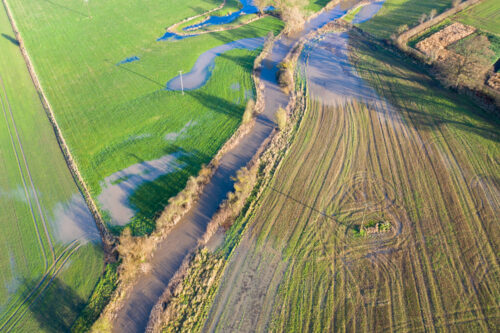Estimated financial losses faced by UK farmers due to wet weather impacts on key arable crops
Arable farmers face losing nearly a billion in revenue as a result of the wet winter.
Last updated:
This winter has been unprecedentedly wet, coming at the end of the wettest 18 months in the UK since records began in 1836.
Key findings
This has had a significant impact on farmers’ cropping plans, with wet weather in the autumn preventing the drilling of winter crops, and ongoing wet weather in February and March preventing the drilling of spring crops.
A re-run of the Agriculture and Horticulture Development Board’s (AHDB) ‘early bird survey’ – which asks farmers what their cropping plans are – in March 2024 suggests a marked reduction in many key winter crops such as wheat and barley. This has led to significant media coverage. Previous ECIU analysis has used this survey in conjunction with Defra yield data to estimate the potential impact of this on production volumes for these crops at harvest 2024.
Using these harvest estimates, we project a 19.0% reduction in revenue compared to 2023 for winter wheat, winter barley, spring barley, oats and oilseed rape. This increases to a 23.8% decline in revenue when compared to the 2015-2023 average.
The production of spring barley and oats (also spring sown) is forecast to increase by 26.8% and 22.7% respectively compared to 2023 due to the larger area of spring crops forecast to be sown this year, increasing revenue compared to 2023 by £218m. However, this is not nearly enough to compensate for the £1.12 billion decline in revenue associated with wheat, winter barley and oilseed rape losses of 26.5%, 33.1% and 38% respectively, compared to 2023. All crops are harvested between July and September.
Taken together, we estimate that UK farmers stand to lose £889m on these crops in 2024 compared to 2023. Compared to the 2015-2023 average production, this increased to £1.18 billion at 2024 prices.
